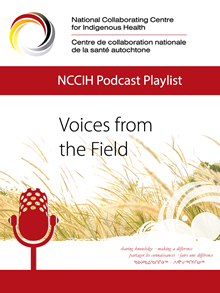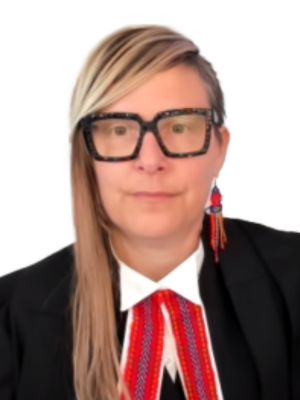 NCCIH Voices from the Field Podcasts
NCCIH Voices from the Field Podcasts
Voices from the Field
Welcome to Voices from the Field, a podcast series produced by the National Collaborating Centre for Indigenous Health (NCCIH), which focuses on innovative research and community-based initiatives promoting the health and well-being of First Nation, Inuit and Métis peoples in Canada.
Episode 32 – Decarceration and health: Breaking down bars for systemic change – Part 2: Dr. Justin Tetrault
Description
Decarceration and health: Breaking down bars for systemic change, is a mini-series within Voices from the Field. It builds off the NCCIH report, Barred: Over-incarceration of Indigenous people in Canada’s criminal legal system, the health implications, and opportunities for decarceration. The report informs the public health crisis pertaining to the over-incarceration of First Nations people, Inuit, and Métis people in Canada’s criminal legal system and explores avenues to decarceration through community-based justice alternatives, including diversion programs, Indigenous courts, and Indigenous-led healing lodges. Over-incarceration has both immediate and far-reaching negative health impacts and is a determinant of health. This mini-series hears from experts in the field about the realities and impact of community-based justice alternatives, their connection to health, and what is needed to affect and inspire systemic change and address the current injustices reflected in the over-incarceration of Indigenous people across the country.
Decarceration and health: Breaking down bars for systemic change – Part 2: Dr. Justin Tetrault. In this episode, we hear from Dr. Justin Tetrault, a Métis criminologist and Assistant Professor of Sociology at the University of Alberta. We learn about Dr. Tetrault’s research in prison environments and the importance of Indigenous programming in prisons; as well as the critical issues affecting health and well-being for Indigenous people in prison. We also learn about what is needed and being done to spark policy change and support Indigenous people’s self-determination over justice and healing.
Listen on SoundCloud
Download a transcript of the podcast (PDF)
Download a list of resources related to this podcast (PDF)
Bios

Dr. Justin Tetrault – is an Assistant Professor of Sociology at the University of Alberta, Augustana campus. His research focuses on social movements, political theory, qualitative methods, decolonization, and prisons. Justin is also a senior researcher and project manager of the University of Alberta Prison Project, a multi-year study of life experiences of imprisoned people. Through this work, he has published on Indigenized programming and race relations inside Western Canadian prisons. His current research examines the obstacles Indigenous people face upon release from prison. Justin also studies Canadian nationalism and has published on right-wing extremism and hate crime. Justin is a proud citizen of the Manitoba Métis Nation.

Andrea Menard – I am a Métis individual associated with the Otipemisiwak Métis Government and work on Treaty 6 lands in amiskwacîwâskahikan (Edmonton). Originally, my family hailed from the now-dissolved Red River Settlement within Treaty 1 territory. Our Métis lineage bears the surnames Bruneau, Carrière, and Larocque.
I am humbled to have been recognized as one of the Top 5 Most Influential Lawyers of 2023 by CIO Times and as one of the Top 25 Most Influential Lawyers of 2022 by Canadian Lawyer Magazine. These accolades reflect my deep commitment to partnering with Indigenous nations across Treaties 4, 6, 7, 8, and 10, including collaborations with the Otipemisiwak Métis Government.
My personal journey as a Métis individual informs my ambition to reform academic and legal workplace policies through the inclusion of Indigenous laws, enriched by my PhD studies in Social Dominance Theory and Legal Pluralism at Royal Roads University in the Doctor of Social Sciences program.
As a sessional law instructor at the University of Calgary’s Faculty of Law and at Osgoode Hall Law School, I develop and teach innovative courses such as “Reconciliation and Lawyers” (LAW 693) and “In Search of Reconciliation Through Dispute Resolution” (ALDR 6305). In addition, I serve as the Lead Educational Developer for Indigenizing Curricula and Pedagogies at the Centre for Teaching and Learning at the University of Alberta.

Denise Webb – is a Research Associate with the National Collaborating Centre for Indigenous Health. Denise holds a Master of Science in Health Services Research, with an emphasis in health policy and specialization in Indigenous health, from the Institute of Health Policy, Management, & Evaluation at the University of Toronto. Her research focuses on the intersection and relation between health policy and First Nations, Inuit, Métis public health. Denise is of Irish and Scottish settler ancestry and is an aspiring ally, working toward informing the decolonization of health systems and policy research.